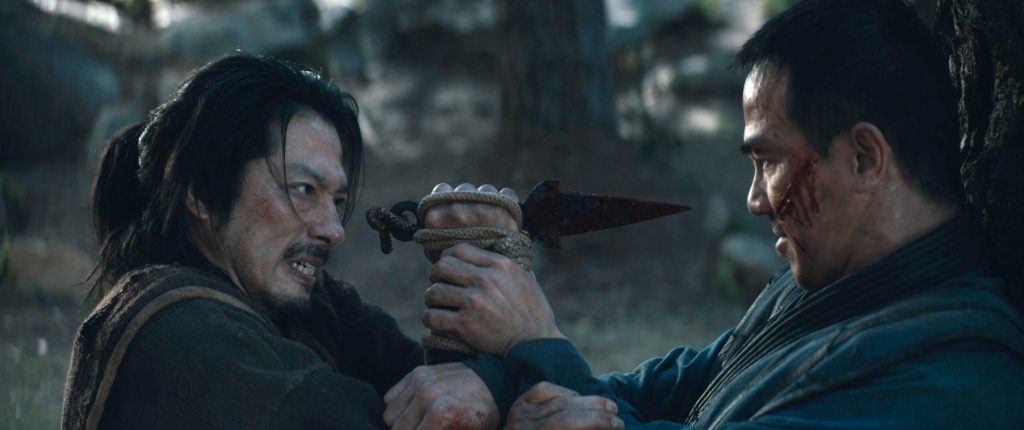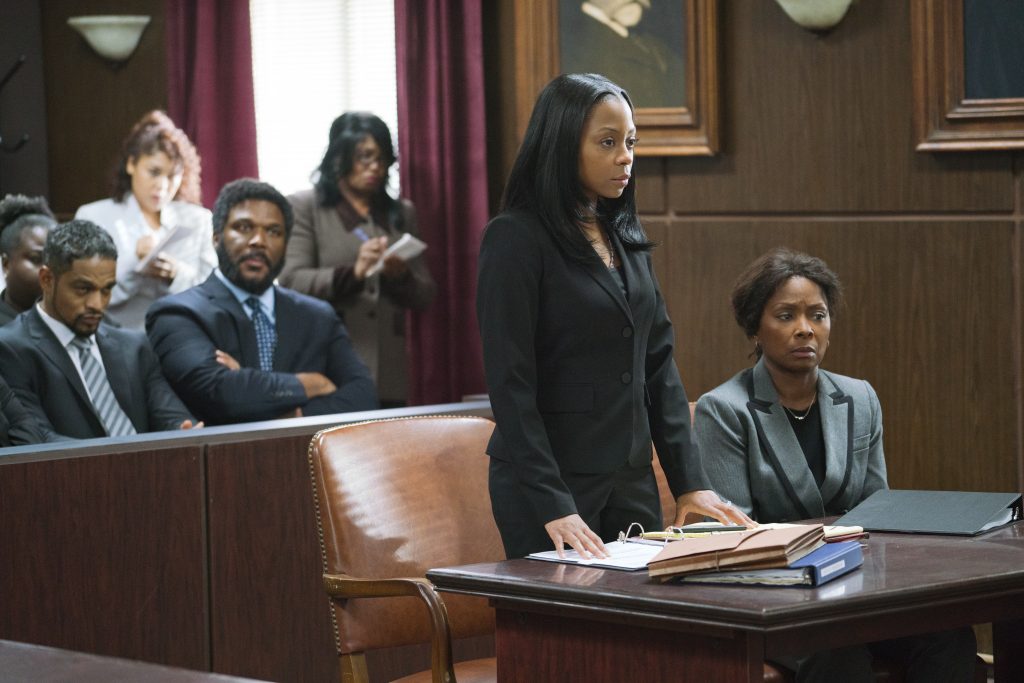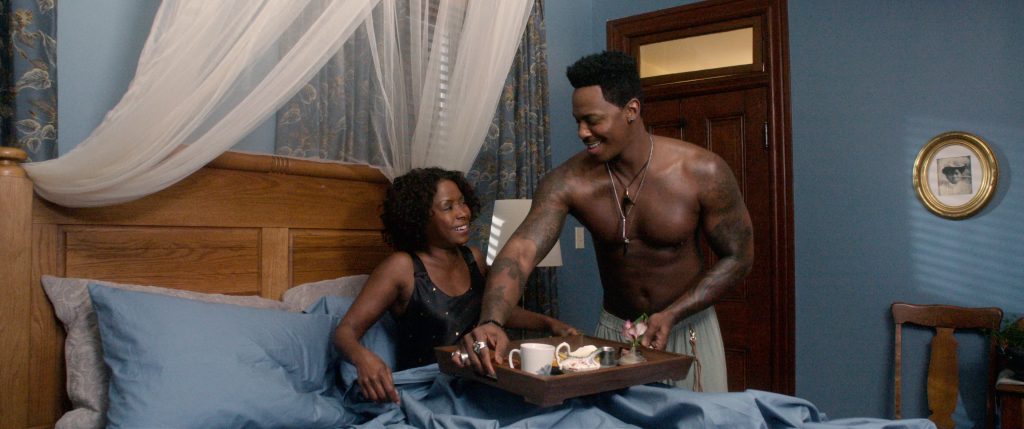April 22, 2021
by Carla Hay

Directed by Simon McQuoid
Some language in Chinese and Japanese with subtitles
Culture Representation: The fantasy action flick “Mortal Kombat” features a racially diverse cast (Asian, white and African American) portraying humans, mutants and monsters in various realms of the universe.
Culture Clash: Fighters in Earthrealm and Outworld face off in the ultimate universe showdown called Mortal Kombat.
Culture Audience: Besides the obvious target audience of people who are fans of the “Mortal Kombat” video games and franchise, this “Mortal Kombat” movie reboot will appeal primarily to people who want to see bloody action films and don’t care about terrible dialogue and flimsy storylines.

The 2021 movie reboot of “Mortal Kombat” should please fans of the video game who want to see an action flick that stays true to the video game’s bloody violence. However, compared to the 1995 “Mortal Kombat” movie, what hasn’t changed is the train wreck of stiff acting, embarrassingly bad dialogue and a stale plot. Thanks to improvements in technology, the visual effects are unsurprisingly better in the 2021 “Mortal Kombat” than they were in the 1995 “Mortal Kombat.” The reboot’s fight choreography is also superior to its predecessor. But these fight scenes aren’t necessarily all that suspenseful or thrilling, because everything is very hollow and predictable.
Directed by Simon McQuoid (in his feature-film directorial debut), the 2021 version of “Mortal Kombat” is one of those movies where death can be meaningless and very fake. There are at least three characters in the movie who are seen “dying” in the film, but then they come back to life with little or no explanation. It just reeks of the filmmakers needing to fill up the movie with more scenes with these characters to stretch out the already very thin plot. After all, you can’t have the big group showdown at the end if half of the main characters are dead.
Just like in the 1995 version of “Mortal Kombat,” the story is centered on a major battle called Mortal Kombat, which pits elite fighters against each other from different parts of the universe. Earthrealm and Outworld are once again the two places whose warriors are going head-to-head in Mortal Kombat. There are many returning characters and a few new characters to this “Mortal Kombat” movie.
The returning hero characters are Lord Raiden (played by Tadanobu Asano), who acts as a mentor/leader to the Earthrealm fighters; Liu Kang (played by Ludi Lin), a former Shaolin monk; Sonya Blade (played by Jessica McNamee), an American Special Forces officer; and Jackson “Jax” Briggs (played by Mehcad Brooks), Sonya’s military partner. Making his debut in a “Mortal Kombat” live-action film is Kung Lao (played by Max Huang), Liu Kang’s cousin who is a descendant of a legendary former Mortal Kombat champion named the Great Kung Lao.
The returning villain characters are Shang Tsung (played by Chin Han), a demon sorcerer who is the leader of the Outworld fighters; Bi-Han/Sub-Zero (played by Joe Taslim), who has the power to cause ice storms and to kill people by putting them in deep freezes; and Goro (voiced by Angus Sampson), the four-armed monster. The character of Reptile makes an appearance in a visual manifestation that’s different from what’s in the “Mortal Kombat” animated films.
In the group of Earthrealm fighters, there’s always someone who’s new to learning about the legends and history of Mortal Kombat while on this journey. In the 2021 version of “Mortal Kombat,” this character is an American mixed-martial arts (MMA) fighter named Cole Young (played by Lewis Tan), who is a former champ on a losing streak when he finds out that he’s been chosen for Mortal Kombat. (In the 1995 “Mortal Kombat” movie, the character who was ignorant about Mortal Kombat’s history was American movie action star Johnny Cage, played by Linden Ashby.)
Also new to the 2021 “Mortal Kombat” movie reboot are Cole’s wife Allison, nicknamed Ali (played by Laura Brent), and their daughter Emily (played by Matilda Kimber), who’s about 11 or 12 years old. The characters of Ali and Emily are awkwardly placed throughout the movie because they only have “damsel in distress” or “cheerleader” roles in relation to Cole. For example, in the middle of a Mortal Kombat fight in another part of the universe, a villain could suddenly appear on Earth to possibly cause harm to Ali and Emily, just to remind viewers that Ali and Emily exist while Cole is off fighting in Mortal Kombat.
It’s shown in the beginning of the movie how Bi-Han/Sub-Zero and Japanese warrior Hanzo Hashashi (played by Hiroyuki Sanada), also known as Scorpion, became enemies in 1617. That’s when Hanzo was living with his wife Harumi (played by Yukiko Shinohara), pre-teen son Satoshi/Jubei (played by Ren Miyagawa) and baby daughter (played by Mia Hall) in Japan. Bi-han and his thugs invaded Hanzo’s home, and you can easily figure out the rest. In the present day, Sub-Zero comes to Earth and goes on a rampage because he’s been sent by Shang Tsung to murder the rare people on Earth who have been chosen to fight in Mortal Kombat.
The heroic Earthrealm people who do battle in this version of “Mortal Kombat” also have a reluctant allegiance with an obnoxious Australian mercenary named Kano (played by Josh Lawson), who spews dumb jokes almost as often as he spews curse words. Kano was also in the 1995 “Mortal Kombat” movie, but in the 2021 version of the movie, Kano spends more time with the heroes than with the villains.
The Earthrealm people need Kano as a guide to Raiden’s temple so that they can train for Mortal Kombat. Sonya has kidnapped Kano and kept him prisoner in her hideout when Cole arrives and he’s introduced to Kano. (The movie doesn’t show the kidnapping.)
Kano only promises to lead them to Raiden’s temple if he’s paid $3 million. Sonya makes the deal, but smirks when she privately confides in Cole that she doesn’t really have the money. And it’s right then and there that viewers can predict what Kano will do later when he finds out that he won’t be getting paid.
The 2021 version of “Mortal Kombat” has a half-Tarkatan, half-Edenian fighter named Mileena (played by Sisi Stringer), who is on Shang Tsung’s team. Her villain superpowers include the ability to teleport and using her detachable jaw with a ferocious set of teeth. And speaking of deadly teeth, the vampire Nitara (played by Mel Jarnson) is also in the movie but doesn’t have enough screen time. Two of Shang Tsung’s other underlings are Kabal (played by Daniel Nelson) and Reiko (played by Nathan Jones).
As a result of all these additional characters that weren’t in the 1995 “Mortal Kombat” movie, this 2021 version of “Mortal Kombat” over-relies on showing simultaneous fight scenes with the heroes in various locations having individual face-offs with villains. These fights aren’t shown by using split-screen editing but by jumping back and forth between fight scenes that are going on at the same time. After a while, these simultaneous fight scenes actually become monotonous. It’s like someone with a short attention span speaking, but not being able to concentrate on one thing at a time, and in the end, having nothing substantial to say.
The 2021 “Mortal Kombat” movie screenplay (written by Greg Russo and Dave Callaham) is filled with cringeworthy conversations. The chief culprit is motormouth bully Kano, who can’t stop insulting people and yammering about how great he thinks he is. But his non-stop ego posturing is made worse by the writers’ failed attempts to make Kano sarcastically funny. In one scene, Kato tries to ridicule Kung Lao, who wears trousers resembling parachute pants, by calling him MC Hammer, who was famous for wearing parachute pants. That outdated joke might have worked in 1995, but not now.
And in another scene, Kano gets into a heated argument with Liu Kang and Kung Lao during a group dinner. Liu lectures Kano about Kung Lao: “He is here to save you because you cannot save yourself. You’re like an aggressive little bunny—soft and useless—angry, mentally and physically. You should be on your knees to this man.” Kano’s reply: “Sit down, shut up, and pass me a fucking egg roll!”
If you start to get bored or confused by this tangled mishmash of characters in the first 15 minutes of the movie, then “Mortal Kombat” probably isn’t for you. It’s the type of movie that was made for die-hard fans of the video games who already know all the backstories and worldbuilding of this franchise. The 2021 version of “Mortal Kombat” doesn’t take a “less is more” approach. And that means, compared to the 1995 “Mortal Kombat movie, “more is a mess.”
Warner Bros. Pictures will release “Mortal Kombat” in U.S. cinemas and on HBO Max on April 23, 2021. The movie was released in several other countries from April 8 to April 21, 2021.


